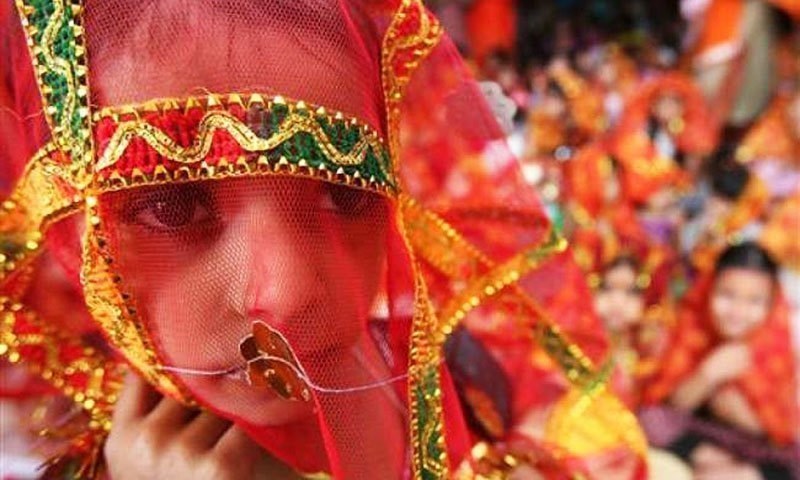After over five years of deliberations by different stakeholders, the social welfare department has finalised draft of a proposed law to replace the colonial-era Child Marriage Restraint Act, 1929. In the draft of the Khyber Pakhtunkhwa Child Marriage Restraint Bill, 2019, the department has also finalised the most controversial issue related to the permissible minimum marriageable age for a female.
The Child Marriage Restraint Act (CMRA) 1929, which is still applicable to Khyber Pakhtunkhwa, defines a child as a person, if a male, is under 18 years of age, and if a female, is under 16 years of age. A working group constituted by the KP Child Protection and Welfare Commission continued to discuss the issue of prohibitory age of a male and female in the proposed law and finally it came to conclusion that the prohibitory age of marriage for both male and female should be 18 years.
A summary has now been moved by the department for approval of the chief minister after which it would be referred to the provincial cabinet for final approval. In a recent function, provincial information minister Shaukat Yousafzai said that the Bill would be tabled in the KP Assembly after its approval by the cabinet.
Deliberations over the issue continued during the previous provincial government of Pakistan Tehreek-i-Insaf, but it could not be finalised because of the controversy revolving around the permissible age for a female to marry.
The prohibitory age of a female for the purpose of marriage has been under discussion across the country for the last many years as in past the Council of Islamic Ideology had declared as against injunctions of Islam the raising of marriageable age for a female from 16 years to that of 18 years.
In March 2014, the CII in its meeting had ruled that laws related to minimum age of marriage were against Islamic teachings and that children of any age could get married if they had attained puberty.
Deputy chief child protection officer of the province, Ijaz Mohammad Khan, had in a recent function given comparison between the existing law and the draft bill. The proposed law provides for punishment of up to three years imprisonment and a fine of Rs45,000 for the offence of child marriage. He said that the offence under the proposed law should be cognizable, non-bailable and non-compoundable (which could not be compromised) and the trial court should conclude the trial within 90 days.
He said that it would be binding on a nikah registrar to check the national identity card of both the parties to the registration of marriage.
Presently, the CMRA 1929 provides punishment of simple imprisonment up to one month or fine of Rs1,000, or both, for contracting a child marriage by a male above 18 years of age; for performing or conducting a child marriage; and for parent or guardian involved in a child marriage.
Furthermore, no court shall take cognizance of any offence of child marriage except on a complaint made by the concerned union council or by such authority empowered by the the provincial government for that purpose.
Prior to the enactment of Constitution (Eighteenth amendment) Act, 2010, the issue related to “marriage and divorce” was in the Concurrent Legislative List of the Constitution and both the federal and provincial legislatures were empowered to legislate on it and in case of any conflict between the two laws the federal law had to prevail. This issue is now a provincial subject and only the provinces are empowered to legislate over it.
After the 18th Constitutional Amendment, Sindh province took lead from other provinces over the issue by enacting the Sindh Child Marriage Restraint Act, 2013, which was published in the official gazette in June 2014. In that law the prohibitory age of a female was enhanced to 18 years from the existing 16 years. The law enhanced punishment for contracting a child marriage to maximum three years rigorous imprisonment along with fine. This law has made the offence, cognizable, non-compoundable and non-bailable.
Afterwards, the Punjab government enacted the Child Marriage Restraint (Amendment) Act, 2015, in March 2015, but instead of repealing the CMRA 1929 it made several amendments to that law. Under those amendments imposition of a six-month prison term and fine of Rs50,000 was introduced for a person contracting child marriage. However, the issue of changing the prohibitory age for marriage was not touched and in the definition of a female child the age given is 16 years.
In April this year, the Senate passed a bill – Child Marriage Restraint (Amendment) Bill, 2018 – tabled by Senator Sherry Rehman. However, the said bill has yet to be passed by the National Assembly. The said bill is only meant for Islamabad Capital Territory. That bill also provides for enhancing the permissible minimum age of marriage to 18 years.
Moreover, another bill was tabled in the National Assembly in May 2019 by Dr Ramesh Kumar, a PTI MNA, which also proposed enhancement in punishments as well as the permissible age. The said bill was referred to the concerned standing committee for discussion.
Experts on the subject believe that the KP government should not only make it possible to pass the proposed bill at the earliest, but it should also take steps for proper implementation of the law as even the existing law has very rarely been implemented.
Published in Dawn, July 15th, 2019
















































